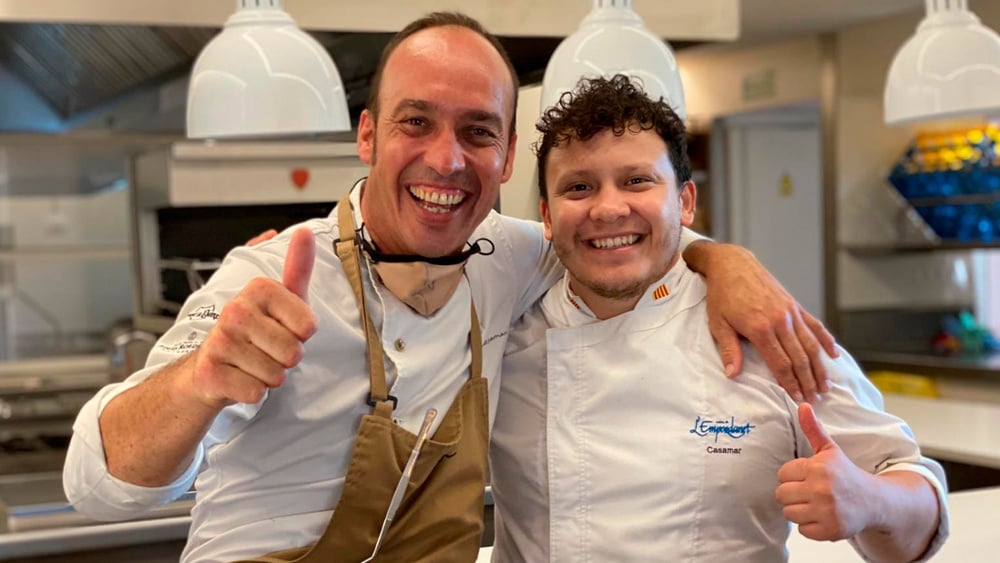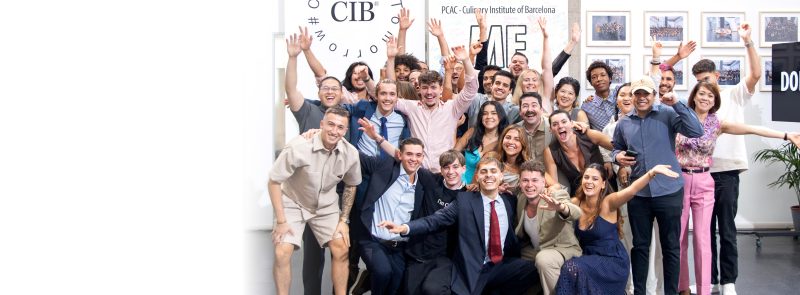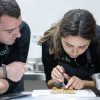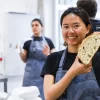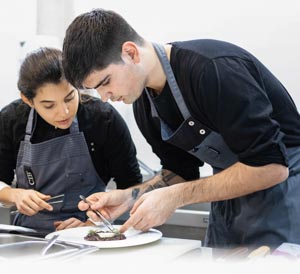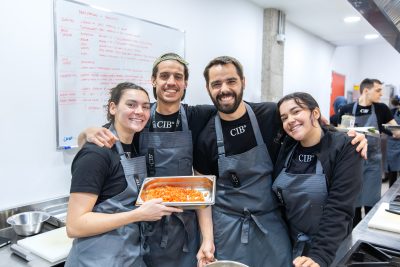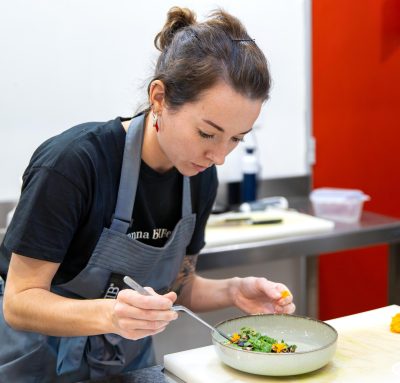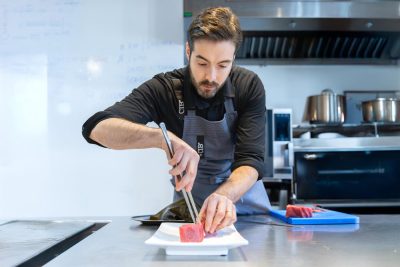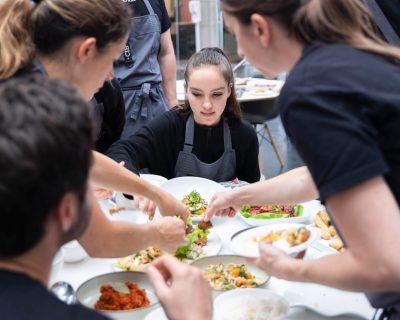The main goal of an internship, a stage, is to show students the real world inside a professional kitchen. This reality differs from what they have been used to perceive at school. Its rhythm, its intensity, its sounds and of course the tension in the kitchen are what strike the most students, during their first days of internship.
How does the internship work here at the CIB?
1. How does the CIB organize the stage?
At the CIB we go a beyond what is normally established as the standard of professional internships. We choose restaurants one by one, and we evaluate them through rigorous criteria. The evaluation continues during and after the stage period, this helps us measuring their capacity and commitment, so that we know the stage will be compatible and part of the training.
To do this, we interview who is in charge of the establishments and we analyze their values, their vision, their procedures, their gastronomic and culinary criteria, their value proposition, their structure and development in human resources. Moreover, we want to see their commitment during the time a CIB student will be with them. We want our student to be treated as a normal worker, helping in whole aspects of the kitchen.
CIB students will never feel alone during their stage; the institute and their tutors will always be with them. We use different channels to communicate and solve problems and, of course, there is a periodic follow up of the stage experience.
2. Restaurants suitable for stage
Ferran Adriá ha explicado muchas veces su visión de cómo debe entenderse un stage. Cuenta que, en El Bulli, tras años de éxitos, los que formaban el equipo de trabajo principal del mejor restaurante del
Ferran Adriá has explained many times his vision of how a stage should be. He says that, at El Bulli, after years of success, those who were working for the best restaurant in the world, could become accustomed to it and start being less demanding. Ferran Adrià called this group the “first circle”, but there is a “second circle”, the one composed by chefs from other restaurants, who stayed there for few months to learn or perfect their techniques. That “second circle” reminded the “first circle” that they were important and that they needed to transcend through their work. When a professional chef spends months working for free in a restaurant, with the purpose of learning, he has to be precise because they expect him to be excellent.
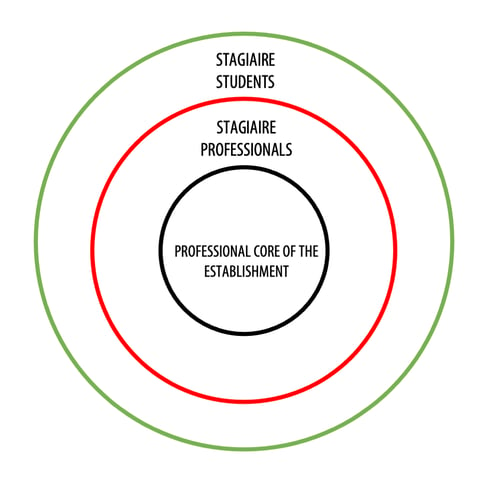
Furthermore, Adrià says a “third circle” exists. This last circle is made of stagiaire students who have just finished studying, they are the ones who drive towards excellence thanks to their micro-contributions. Adrià remembers that in the daily roll call, stagiaires were always contributing with their particular visions, habits, cultures and that increased the value of processes by adding more excellence, rigor, perfection, as well as new solutions.
At the CIB we are looking for restaurants and chefs who share Ferran Adriá’s vision about the role of the stagiaire. We choose chefs who are committed to continuity as part of the student’s training, chefs who listen, chefs who are able to detect and employ talents.
That is why when CIB students begin their internship, they are sure that they will continue learning in a professional environment. Our students will not peel potatoes, fry croquettes or clean non-stop while watching what others do things.
CIB students are appreciated everywhere, their profile and preparation are highly valued. Every day, we receive requests from all over the world, but as previously mentioned, not all establishments see the stage as a training period. Unfortunately, many restaurants see a stagiaire as a low-cost resource; these restaurants will not host any CIB student.
3. How to choose a restaurant for my stage (internship)
Here at CIB, we know that different students can be a better match for restaurants of a different type – and that is why a specific “profile” of a student exists for each restaurant.
The assignation of the profile starts the moment the CIB´s tutors can distinguish and evaluate the interests, attitude and skills of every single student. This process starts at the beginning of the fourth month of study. This is the moment when the student and the tutor start the search for the ‘perfect match‘. Usually, in this period the students are presented with the different options and the final decision and chosen path depends on student´s choice – but you can always count on tutor’s advice and support.

The students of the program Haute Cuisine Chef Diploma will have the 3-moths long internship in one restaurant (sometimes in two different restaurants). Those who are studying for the Gran Chef Diploma will have 6 months of internship. Depending on the student’s preference, the stage can be performed as one continuous internship, or it can be split into two periods of 3 months and is done in one to three restaurants.

In any case, this experience is a part of the training and will be always supervised by CIB through the phone calls, videoconferences, and visits at the restaurants, during which not only the students but also the chefs and those responsible for the interns will be interviewed. The follow-up evaluations and reports will be issued during the whole stage.
4. How is the stage integrated in the CIB training model?
At CIB we feel proud of the preparation for the labour market participation that our students represent as it shows during the stage in the restaurants. They start their internship with the knowledge of the product and techniques that can be applied in any context. This, among others, serves as a competitive advantage in the professional environment.

During the training of Haute Cuisine Chef Diploma and Gran Chef Diploma, the students are exposed to overcoming the real obstacles in the controlled environment during what we call Challenges. During the internship or stage, they apply everything that they have learnt to the real-life, preparing themselves for one of the biggest challenges of all – their first contact with the professional life of a chef.
The four pillars of CIB methodology: knowledge acquisition, lateral skills development, detection and application of the possibilities and attitudinal empowerment, which students learn, are being transferred and applied in the professional environment.
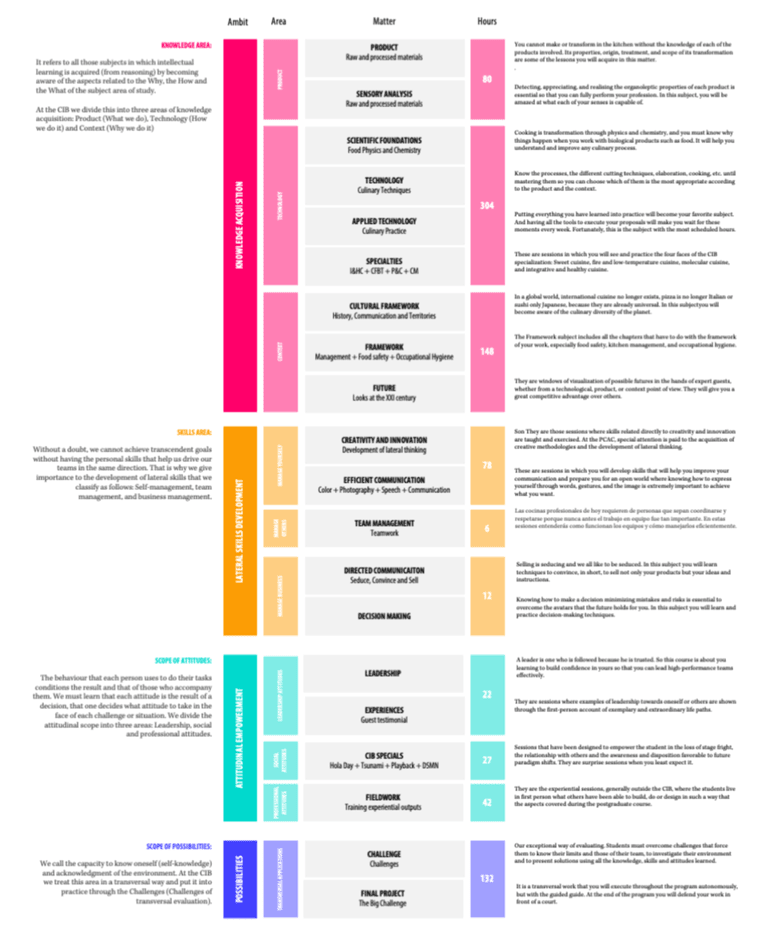
5. Where are the establishments that have a stage agreement with the CIB?
A major part of the restaurants is in Cataluña, but also there is a possibility of having a stage in different parts of Spain and different countries and even continents. CIB is having an agreement with restaurants in 5 continents and of different format.
It happens that students suggest an establishment with which the Culinary Institute of Barcelona does not cooperate with. In such a case, we contact the restaurant, analyse the situation and if it is suitable with our requirements, we put all our effort to establish cooperation and we add the restaurant to the list of places available for CIB students.
6. List of the restaurants where you can do your stage
Categories of the restaurants of the internship of Culinary Institute of Barcelona:
- Gastronomic category: Category of the gastronomic offer.
- Michelin Star Category: Acknowledgement of the Michelin guide of one, two or three stars.
- Chef and tutor: Chef, Executive Chef or responsible tutor.
65 of more than 200 restaurants around the world with which CIB has an agreement.
| Restaurant | Restaurant Typology | Chef |
|---|---|---|
| Celler de Can Roca (***) | Avant-garde kitchen | Joan Roca |
| Àbac (***) | Avant-garde kitchen | Jordi Cruz |
| Lasarte (***) | Avant-garde kitchen | Martín Berasategui, Paolo Casagrande |
| 5-Cinco (*) | Avant-garde kitchen | Paco Perez |
| A Casa do Porco | Signature Brazilian cuisine | Jefferson Rueda |
| Alkimia (*) | Avant-garde Catalan cuisine | Jordi Vilà |
| Atempo restaurant (*) | Avant-garde kitchen | Jordi Cruz |
| Aürt (*) | Avant-garde kitchen | Artur Martinez |
| Bardeni – Caldeni | Meat bar | Dani Lechuga |
| Bo·tic (**) | Avant-garde kitchen | Albert Sastregener |
| Ca l’Enric (*) | Avant-garde Catalan cuisine and game | Jordi Juncà |
| Can Jubany (*) | Avant-garde Catalan cuisine | Nandu Jubany |
| Casamar (*) | Avant-garde Catalan cuisine | Quim Casellas |
| Castell Perelada (*) | Catalan signature cuisine | Xavier Sagristà |
| Cinc Sentits (**) | Contemporary Catalan cuisine | Jordi Artal |
| Compartir | Avant-garde kitchen | Mateu Casañas |
| D.O.M (**) | Avant-garde Brazilian cuisine | Alex Atala |
| Direkte Boqueria | Eastern Catalan fusion cuisine | Arnau Muñío |
| Disfrutar (**) | Avant-garde kitchen | Oriol Castro, Eduard Xatruch |
| Dos Palillos (*) | Avant-garde oriental fusion cuisine | Albert Raurich |
| Dos Pebrots | Avant-garde Mediterranean cuisine | Albert Raurich |
| Echaurren Tradición | Traditional cuisine | Francis Paniego |
| El Invernadero (*) | Vegetable haute cuisine | Rodrigo de la calle |
| El Nacional | Different concepts | Michel Gradeler |
| El portal (**) | Avant-garde kitchen | Francis Paniego |
| Els Casals (*) | Catalan signature cuisine | Oriol Rovira Prat |
| Els Pescadors | Sea Cuisine | Lluis Fernandez |
| Els Tinars (*) | Avant-garde kitchen | Marc Gascons |
| Enigma (*) | Avant-garde kitchen | Albert Adrià |
| Fonda Xesc (*) | Avant-garde Catalan cuisine | Francesc Rovira |
| Hoja Santa (*) | Avant-garde Peruvian cuisine | Albert Adrià, Paco Mendez |
| Hotel Condes de Barcelona | Banquet and street food kitchen | Carlos Fernandez |
| Hotel España | Market kitchen | German Espinosa |
| Hotel Sofia | Hotel haute cuisine | Roberto Holz |
| L’Escaleta (**) | Avant-garde kitchen | Kiko Moya |
| La Boscana (*) | Avant-garde kitchen | Joel Castanyé |
| La Caléndula | Mediterranean cuisine | Iolanda Bustos |
| La Salseta | Mediterranean cuisine | Valentí Mongay |
| La Taverna del Ciri | Traditional catalan cuisine | Marc Ribas |
| Les Cols (**) | Avant-garde kitchen | Fina Puigdevall |
| Lluerna (*) | Avant-garde kitchen | Victor Quintillà |
| Maní (*) | Avant-garde kitchen | Helena Rizzo |
| Marques de Riscal (*) | Avant-garde kitchen | Francis Paniego |
| Miramar (**) | Avant-garde kitchen | Paco Perez |
| Moments (**) | Avant-garde kitchen | Raül Balam |
| Nairod | Avant-garde kitchen | David “Rusti” Rustarazo |
| Nayara Resort | Avant-garde kitchen | Nicolas Di Paolo |
| NOBU HOTEL | Avant-garde Japanese Cuisine | Nobu Matsuhisa |
| Oria (*) | Avant-garde kitchen | Martín Berasategui |
| Pahissa del Mas | Avant-garde kitchen | Jordi Vallespi |
| Pakta (*) | Vanguard Nikei Fusion Kitchen | Albert Adrià |
| Panot | Catalan bourgeois cuisine | Marc Ribas |
| Pork | Product kitchen | Oriol Rovira |
| Pur | Product kitchen | Nandu Jubany |
| Quinze ous | Product kitchen | Ferran Pont |
| Rasoterra | Vegetarian bistro | Daniele Rossi |
| Remanso do Bosque | Brazilian cuisine | Thiago Castanho |
| Restaurante 2254 | Creative Tapas | Nuncio Cona |
| Skye (Hotel Unique) | International kitchen | Emmanuel Bassoleil |
| Suculent | Avant-garde kitchen | Tonet Romero |
| Tanit | Catalan-Brazilian fusion cuisine | Oscar Bosch |
| Terraza Al Aire | Creative Tapas | Martín Berasategui |
| Virens | Vegetable haute cuisine | Rodrigo de la Calle |
| Xavier Pellicer | Healthy kitchen | Xavier Pellicer |
| Yakumanka | Avant-garde Peruvian cuisine | Gastón Acurio |

